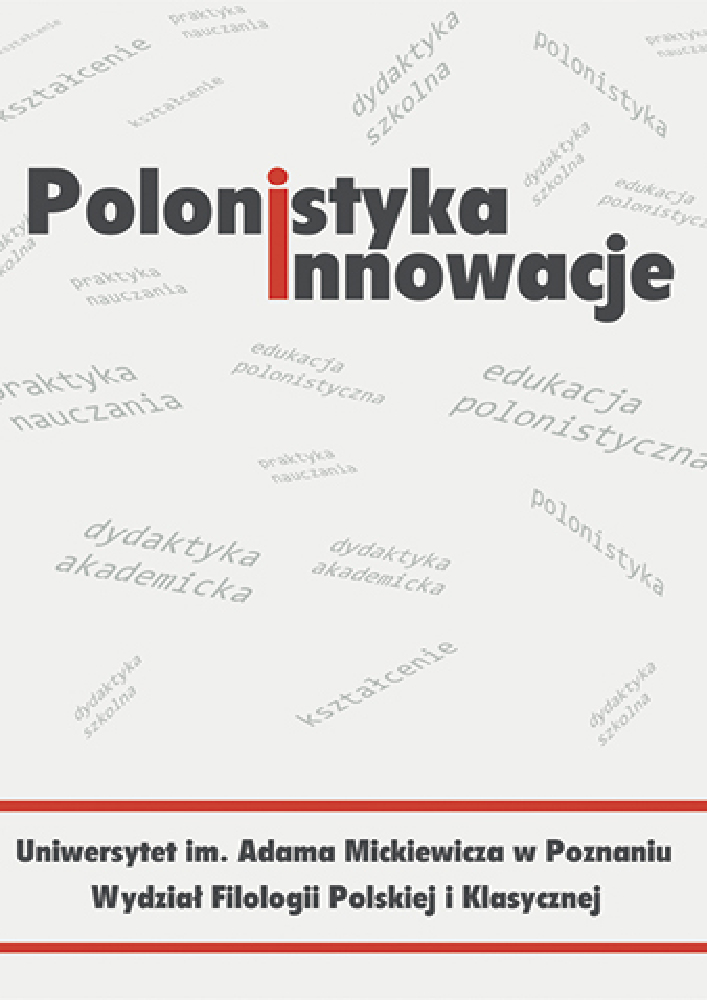Abstract
The article addresses the issue of genre (genology) and gender in the book cycle The Reaper by Paulina Hendel. The first part of the article presents the position of Hendel’s book series in the field of Polish young adult literature, particularly in the current context of the popularity of Slavic motifs in contemporary juvenile literature, followed by an interpretation of some of the Slavic motifs present in the series and their function. The second part of the article examines issues in the field of gender studies, especially in the aspect of slutshaming and victimblaming that appear in the novels
References
Aronson Elliot, 2012, Psychologia społeczna, Poznań.
Ekman Stefan, 2018, Urban fantasy – literatura Niewidocznego, „Creatio Fantastica. Zagadnienia i Problemy Fantastyki”, nr 1(58).
Goblet Margot, Glowacz Fabienne, 2021, Slut Shaming in Adolescence: A Violence against Girls and Its Impact on Their Health, “Int J Environ Res Public Health”. https://doi.org/10.3390/ijerph18126657 DOI: https://doi.org/10.3390/ijerph18126657
Janion Maria, 2006, Niesamowita Słowiańszczyzna: fantazmaty literatury, Kraków.
Keller Jessalynn, 2015, Girls’ Feminist Blogging in a Postfeminist Age, Routledge, Londyn. https://doi.org/10.4324/9781315755632 DOI: https://doi.org/10.4324/9781315755632
Hendel Paulina, 2017a, Żniwiarz. Pusta noc, Poznań.
Hendel Paulina, 2017b, Żniwiarz. Czerwone słońce, Poznań.
Hendel Paulina, 2018, Żniwiarz. Trzynasty księżyc, Poznań.
Hendel Paulina, 2019, Żniwiarz. Droga dusz, Poznań.
Hendel Paulina, 2020, Żniwiarz. Czarny świt, Poznań.
Korzeniewska Wiktoria, Czy Wiedźmin jest słowiański? Analiza Slavic Book, https://slavicbook.pl/czy-wiedzmin-jest-slowianski-analiza-slavicbook/(dostęp: 12.08.2022).
Kostecka Weronika, 2022, Postfeminizm jako perspektywa rozważań nad kulturą popularną – propozycja metody badań literackiej fantastyki dla młodych dorosłych, „Filoteknos”.
Sankowski Robert, 2014, „My, Słowianie” w finale Eurowizji: żaden reprezentujący Polskę artysta nie potrafił dokonać tego od 10 lat, „Gazeta Wyborcza”, https://wyborcza.pl/7,76842,15928830,my-slowianie-w-finale-eurowizji-zaden-reprezentujacy-polske.html (dostęp: 17.08.2022).
Sapkowski Andrzej, 1993, Piróg albo Nie ma złota w Szarych Górach, „Nowa Fantastyka”, 5/128.
Szczepanik Paweł, 2018, Słowiańskie zaświaty. Wierzenia, wizje i mity, Szczecin.
Szymczak-Maciejczyk Barbara, 2021, Polskie urban fantasy. Szkic o mieście i miejskości, „Annales Universitatis Paedagogicae Cracoviensis. Studia Poetica”. https://doi.org/10.24917/23534583.9.11 DOI: https://doi.org/10.24917/23534583.9.11
Urbańczyk Stanisław, 1968, O rekonstrukcję religii pogańskich Słowian, w: Oborny A., Erber B., Kuczyński J., Paprocki B. (red.), Religia pogańskich Słowian. Sesja naukowa w Kielcach, Kielce, s. 29-46.
Young Helen, 2015, Race and Popular Fantasy Literature: Habits of Whiteness, Londyn. https://doi.org/10.4324/9781315724843 DOI: https://doi.org/10.4324/9781315724843
License
Copyright (c) 2022 Agnieszka Kocznur

This work is licensed under a Creative Commons Attribution-NoDerivatives 4.0 International License.

